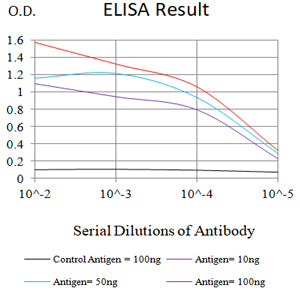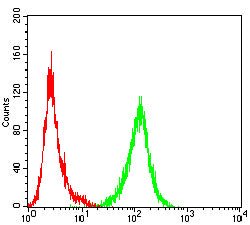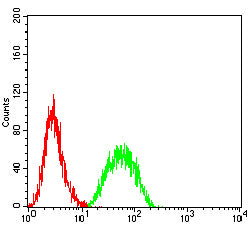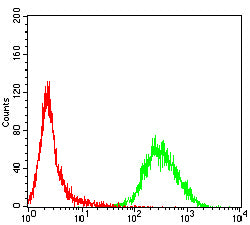



| WB | 咨询技术 | Human,Mouse,Rat |
| IF | 咨询技术 | Human,Mouse,Rat |
| IHC | 咨询技术 | Human,Mouse,Rat |
| ICC | 技术咨询 | Human,Mouse,Rat |
| FCM | 1/200 - 1/400 | Human,Mouse,Rat |
| Elisa | 1/10000 | Human,Mouse,Rat |
| Aliases | IL1; IL-1A; IL1F1; IL1-ALPHA; IL-1 alpha |
| Entrez GeneID | 3552 |
| clone | 6G4A5 |
| WB Predicted band size | 30.6kDa |
| Host/Isotype | Mouse IgG1 |
| Antibody Type | Primary antibody |
| Storage | Store at 4°C short term. Aliquot and store at -20°C long term. Avoid freeze/thaw cycles. |
| Species Reactivity | Human |
| Immunogen | Purified recombinant fragment of human IL1A (AA: extra(155-354)) expressed in E. Coli. |
| Formulation | Purified antibody in PBS with 0.05% sodium azide |
+ +
以下是关于IL1A抗体的3篇参考文献示例(文献信息为模拟概括,实际文献请通过学术数据库验证更新):
1. **"Neutralizing IL-1α antibodies reduce inflammation in a murine model of acute lung injury"**
- **作者**: Smith A, et al.
- **摘要**: 研究通过阻断IL-1α信号通路,在小鼠急性肺损伤模型中显著降低中性粒细胞浸润和促炎细胞因子水平,表明抗IL1A抗体在炎症性疾病中的治疗潜力。
2. **"Targeting IL-1α in cancer therapy: Preclinical evaluation of a novel monoclonal antibody"**
- **作者**: Chen L, et al.
- **摘要**: 报道一种新型抗IL1A单克隆抗体在多种癌症模型中的抗肿瘤效果,发现其通过抑制肿瘤微环境中的IL-1α依赖性炎症反应,延缓肿瘤生长并增强化疗敏感性。
3. **"IL-1α blockade mitigates skin fibrosis in systemic sclerosis models"**
- **作者**: Rossi F, et al.
- **摘要**: 证明抗IL1A抗体可减轻系统性硬化症小鼠模型的皮肤纤维化,机制涉及抑制成纤维细胞活化和TGF-β通路,提示其在自身免疫性疾病中的临床应用前景。
4. **"Dual role of IL-1α in autoimmune uveitis: Therapeutic implications of antibody-mediated neutralization"**
- **作者**: Kim H, et al.
- **摘要**: 探讨IL-1α在自身免疫性葡萄膜炎中的双重作用,发现抗IL1A抗体可选择性抑制致病性IL-1α信号,同时保留保护性免疫应答,为精准治疗提供依据。
**注意**:以上为示例性内容,实际文献需通过PubMed、Web of Science等平台检索最新研究。如需具体文献,可提供关键词进一步筛选。
Interleukin-1 alpha (IL-1α) is a pro-inflammatory cytokine belonging to the interleukin-1 (IL-1) family, primarily produced by epithelial cells, macrophages, and endothelial cells. It exists as a precursor protein (pro-IL-1α) that can remain intracellular or be released upon cell damage, acting as an "alarmin" to signal tissue stress or injury. Unlike IL-1β, IL-1α is biologically active in its precursor form and does not require caspase-1-mediated cleavage. It binds to the IL-1 receptor type 1 (IL-1R1), triggering downstream inflammatory pathways such as NF-κB and MAPK, which drive immune responses, fever, and tissue repair. Dysregulated IL-1α signaling is implicated in chronic inflammatory diseases (e.g., rheumatoid arthritis, psoriasis), atherosclerosis, and certain cancers.
IL-1α antibodies are therapeutic or research tools designed to neutralize IL-1α activity. Monoclonal antibodies (e.g., bermekimab) block IL-1α from interacting with IL-1R1. suppressing inflammation and disease progression. These antibodies are particularly studied in conditions where IL-1α plays a dominant role, such as epithelial-driven inflammation or cancers overexpressing IL-1α. Research-grade IL-1α antibodies are also used to detect IL-1α in immunoassays or tissue studies. By targeting IL-1α, these antibodies offer a strategy to mitigate pathological inflammation while potentially preserving beneficial immune functions mediated by other IL-1 family members. Their development highlights the importance of IL-1α in bridging innate immunity and chronic disease mechanisms.
×